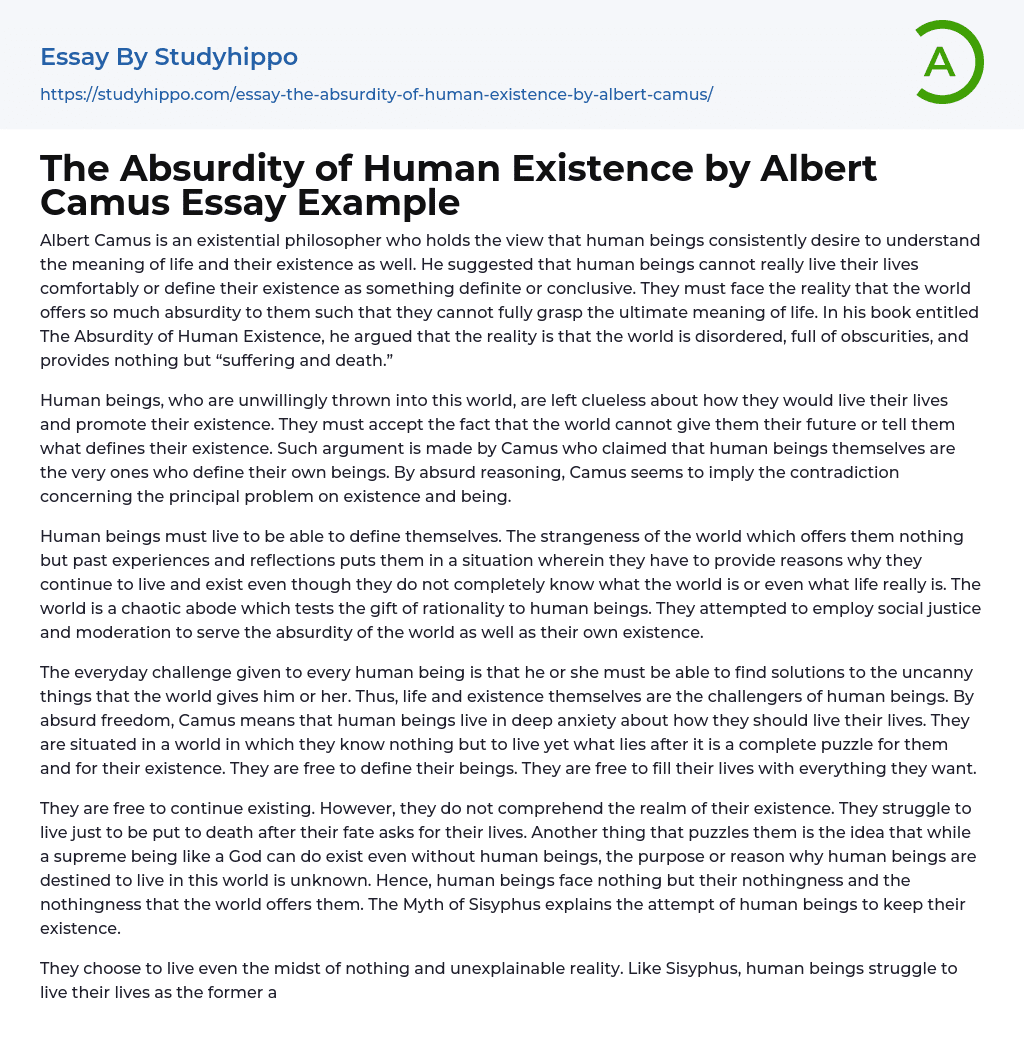

The Absurdity of Human Existence by Albert Camus Essay Example
Albert Camus is an existential philosopher who holds the view that human beings consistently desire to understand the meaning of life and their existence as well. He suggested that human beings cannot really live their lives comfortably or define their existence as something definite or conclusive. They must face the reality that the world offers so much absurdity to them such that they cannot fully grasp the ultimate meaning of life. In his book entitled The Absurdity of Human Existence, he argued that the reality is that the world is disordered, full of obscurities, and provides nothing but “suffering and death.”
Human beings, who are unwillingly thrown into this world, are left clueless about how they would live their lives and promote their existence. They must accept the fact t
...hat the world cannot give them their future or tell them what defines their existence. Such argument is made by Camus who claimed that human beings themselves are the very ones who define their own beings. By absurd reasoning, Camus seems to imply the contradiction concerning the principal problem on existence and being.
Human beings must live to be able to define themselves. The strangeness of the world which offers them nothing but past experiences and reflections puts them in a situation wherein they have to provide reasons why they continue to live and exist even though they do not completely know what the world is or even what life really is. The world is a chaotic abode which tests the gift of rationality to human beings. They attempted to employ social justice and moderation to serve the absurdity of the world
as well as their own existence.
The everyday challenge given to every human being is that he or she must be able to find solutions to the uncanny things that the world gives him or her. Thus, life and existence themselves are the challengers of human beings. By absurd freedom, Camus means that human beings live in deep anxiety about how they should live their lives. They are situated in a world in which they know nothing but to live yet what lies after it is a complete puzzle for them and for their existence. They are free to define their beings. They are free to fill their lives with everything they want.
They are free to continue existing. However, they do not comprehend the realm of their existence. They struggle to live just to be put to death after their fate asks for their lives. Another thing that puzzles them is the idea that while a supreme being like a God can do exist even without human beings, the purpose or reason why human beings are destined to live in this world is unknown. Hence, human beings face nothing but their nothingness and the nothingness that the world offers them. The Myth of Sisyphus explains the attempt of human beings to keep their existence.
They choose to live even the midst of nothing and unexplainable reality. Like Sisyphus, human beings struggle to live their lives as the former attempts to successfully roll the stone up which in the end will always go downward. Camus explains this phenomenon as the effort to understand the ungraspable world and the nothingness of existence. The
moral of the myth which can really be applied to reality is the undying hope which lies in the heart of Sisyphus that he would eventually succeed in rolling the stone upward though he knows that it will soon go down.
Human beings try to understand the strangeness of his existence though he will never be able to do so. Nevertheless, the hope that remains in the heart of human beings allows them to become immune or used to the features of undefined existence. As Sisyphus became used to his task in the underworld, human beings also became impervious to the chaotic setting that the world provides them. In the end, they persist to live and struggle to know the unknowable world.
Reference: Camus, A. (1999). The Absurdity of Human Existence (Second ed. ). Oxford University Press.
- Action Speak Louder Than Words essays
- Can Money Buy Happiness essays
- Albert Camus essays
- Aristotle essays
- Carl Jung essays
- Henry David Thoreau essays
- Immanuel Kant essays
- John Dewey essays
- Karl Marx essays
- Machiavelli essays
- Michel Foucault essays
- Plato essays
- Rene Descartes essays
- Rousseau essays
- Socrates essays
- Thomas Hobbes essays
- Acceptance essays
- Age Of Enlightenment essays
- Child Observation essays
- Confucianism essays
- Conscience essays
- Critical Reflection essays
- Destiny essays
- Determinism essays
- Empiricism essays
- Environmentalism essays
- Epistemology essays
- Ethics essays
- Ethos essays
- Existence essays
- Existentialism essays
- Fate essays
- Free Will essays
- Functionalism essays
- Future essays
- Good And Evil essays
- Human Nature essays
- Individualism essays
- Meaning Of Life essays
- Metaphysics essays
- Natural Law essays
- Personal Philosophy essays
- Philosophers essays
- Philosophy Of Life essays
- Political Philosophy essays
- Pragmatism essays
- Reality essays
- Relativism essays
- Teaching Philosophy essays
- Time essays



